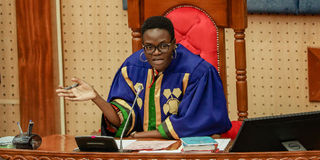Tanzania appeals for Africa's support in bagging IPU presidency

Dr Tulia Ackson, Speaker of the National Assembly of Tanzania.
What you need to know:
- If elected, Dr Ackson will be the first woman from Africa to hold the position and will lead the organisation from 2023-2026.
- The election of the new president of the international organisation of national parliaments will take place in Angola in October.
Tanzania has appealed for the African continent to throw its weight behind its Speaker of Parliament Tulia Ackson, who is its candidate for the Inter-Parliamentary Union (IPU) presidency.
The appeal was made by MP Ng’wasi Kamani who represents special seats under the ruling Chama Cha Mapinduzi (CCM) party.
She addressed the Pan-African Parliament during the adoption of a committee report on gender, family, youth and people living with disabilities.
Ms Kamani noted that Tanzania is the only country in Africa that has given women the rare opportunity to head two arms of government, with President Samia Suluhu as the head of the executive and Dr Ackson heading the legislature.
This, she said, has proven that given a chance, women can also deliver just like men.
The IPU is the main decision making organ made up of parliamentarians from 179 Parliaments out of the 193 countries that have legislative organs.
The East African Community (EAC) member states have agreed to back Dr Ackson in her quest, with speakers from the seven partner states, who met in Arusha, saying her victory would be a win for the region.
The election of the new president of the international organisation of national parliaments will take place in Angola in October.
If elected, Dr Ackson will be the first woman from Africa to hold the position and will lead the organisation from 2023-2026.
Noting that all women need is an opportunity, Nominated Senator Margaret Kamar gave an example of herself, saying her election to the East Africa Legislative Assembly (Eala) paved the way for her election as MP in December 2007.
She said this then saw her serve as a Cabinet minister, an appointment which was followed by her election as senator and deputy speaker of the Kenyan Senate in 2017.
She was later nominated senator by the Jubilee Party, which she said believed in her performance, and was then chosen to serve in the Pan-African Parliament.
Ms Kamar was among those opposed to a proposal to get rid of the quota system of women representation.
Nairobi Woman Representative Esther Passaris, who is part of the Kenyan delegation in the Pan-African Parliament, said Africa has a long way to go where gender parity is concerned.
She said that despite setting aside 47 positions for women to be elected directly to the National Assembly, Kenya’s prtwo thirds gender rule is the only part of the constitution that is yet to be implemented.
“Women still need to be given concessions because we live in a patriarchal society where men have an upper hand,” she said.
Gambian MP Maimuna Ceesay told parliament that gender equity needs to be taken seriously, calling for the enactment of laws for every parliament to have space for women at both the county and national levels.
She added that social economic growth cannot be achieved without the involvement of women, whom she said are major stakeholders in agriculture and small and medium enterprises.
Nyeri Woman Representative Rehab Mukami said domestic parliaments should ensure watertight legislations are enacted to protect women and youth who have suffered years of neglect and marginalisation yet they play critical roles in families.
Senator Danson Mungatana challenged the Pan-African Parliament’s Youth Caucus Committee to push for establishment of education standards for Africa that will ensure couontries speaks on the same wavelength.
Mr Mungatana, who has largely been addressing the parliament in Kiswahili alongside Tanzania’s Damas Kamani, emphasised that Africa needs to speak in one language - - Kiswahili as adopted by the African Union as Africa’s official language.
“The youth caucus should only focus on a mindset change because we need a new generation for Africa. It is they who should champion this - one Africa, one voice,” he said.
The continental parliament also adopted a report on the place of traditional medicine in African health systems, that was tabled by the Committee on Health, Labour and Social Affairs.
The legislators said it's high time traditional medicine regained its place in the health sector, citing the Covid-19 pandemic that affected Africa the least. This, he said, was because the majority of the people resorted to use of herbs to either treat or prevent the disease.
Chief Fortune Charumbira, the Pan-African Parliament’s president, challenged MPs not to shy away from advocating for the use of traditional medicine, joking that after all, the majority of politicians benefit from it, especially during elections.
Other reports adopted were those from the Women’s Caucus and committees in charge of monetary and financial affairs, the rural economy, agriculture, natural resources and environment, transport, industry, communication, energy, science and technology, and audit and public accounts.





